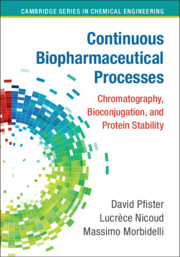Book contents
- frontmatter
- Contents
- Preface
- Notation
- 1 Introduction to Biopharmaceutical Processes
- 2 Fundamentals of Protein Chromatography
- 3 Countercurrrent Separation Processes
- 4 Countercurrent Chromatography for the Capture Step
- 5 Countercurrent Chromatography for the Polishing Steps
- 6 Protein Conjugation
- 7 Protein Aggregation in Biopharmaceutical Processes
- 8 Conclusion
- Bibliography
- Index
4 - Countercurrent Chromatography for the Capture Step
Published online by Cambridge University Press: 22 September 2018
- frontmatter
- Contents
- Preface
- Notation
- 1 Introduction to Biopharmaceutical Processes
- 2 Fundamentals of Protein Chromatography
- 3 Countercurrrent Separation Processes
- 4 Countercurrent Chromatography for the Capture Step
- 5 Countercurrent Chromatography for the Polishing Steps
- 6 Protein Conjugation
- 7 Protein Aggregation in Biopharmaceutical Processes
- 8 Conclusion
- Bibliography
- Index
Summary
This chapter focusses on chromatographic processes for protein capture. The first part provides a detailed description of the mechanistic phenomena involved in protein capture, which can be regarded as a non-competitive binary system protein/impurity, where the protein of interest strongly interacts with the chromatographic medium. Several multi-column counter-current processes allowing the implementation of the sequence of operations necessary in protein capture (load, wash, recovery, regeneration) in a continuous manner are presented in the second part of the chapter. Two process design approaches for multi-column capture processes are provided: an empirical one, which allows to obtain a first guess of the operating conditions from breakthrough curves experiments, and a model-based one, which allows a more rigorous determination of the process variables. The model-based approach is used to compare the performance of multi-column and single-column processes.
Keywords
- Type
- Chapter
- Information
- Continuous Biopharmaceutical ProcessesChromatography, Bioconjugation, and Protein Stability, pp. 110 - 152Publisher: Cambridge University PressPrint publication year: 2018

